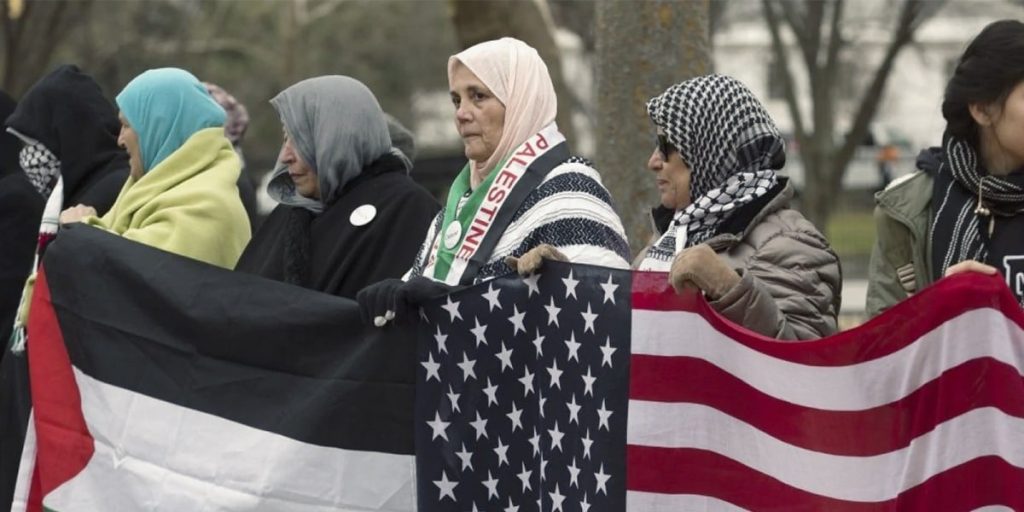Over the past century, Palestinian activism in the United States has undergone significant transformations, shaped by migration waves, political repression, and a persistent fight for recognition. Recent years have seen new organizations emerge, stronger alliances with other social justice movements, and the rise of leaders such as Congresswoman Rashida Tlaib, the first Palestinian-American elected from within the Democratic mainstream, who unapologetically centers Palestine in her political work.
Palestinian struggle in the U.S., however, is not new. According to historian Hani Bawardi, it dates back more than a hundred years. In 1915, Ameen Rihani from Nazareth founded the Free Syria Society in New York, calling for independence from British and French colonialism. By 1922, Palestinians were testifying before the U.S. Congress against the Balfour Declaration, voicing opposition to a “Jewish national home” in Palestine.
In 1944, Khalil Totah of Ramallah co-founded the Institute of Arab American Affairs in New York, lobbying Congress to support Palestinian independence and producing scholarly works to inform the American public. Post-Nakba, Palestinians in America intensified their advocacy for the Right of Return, a demand grounded in international law.
Migration Waves and Community Roots
The 1965 Immigration and Nationality Act opened U.S. borders to Middle Eastern immigrants, leading to a major Palestinian migration wave, especially after the 1967 war. Many resettled in Chicago, Dallas, San Francisco, Houston, and New York. Chicago’s southwest suburb, Bridgeview, became known as “Little Palestine”, while Dearborn, Michigan also emerged as a hub for Arab and Palestinian life.
Despite their growing presence, Palestinians remain statistically invisible due to the U.S. census’s refusal to include “Arab” or “MENA” categories. This invisibility limits demographic data, weakens political representation, and obscures social realities.
Repression and Criminalization
Palestinian activism in the U.S. has long faced repression from both U.S. authorities and Zionist organizations. The 1985 assassination of Alex Odeh, a Palestinian-American activist, by the extremist Jewish Defense League, marked one of the darkest moments in this history. In the 2000s, the U.S. government shut down the Holy Land Foundation, a major Palestinian-American charity, jailing its founders under terrorism charges despite its humanitarian work and Israeli approval to operate.
Others, such as Chicago’s Mohammad Salah, endured imprisonment, torture in Israel, and asset confiscation in the U.S. under the guise of the “War on Terror.” These cases highlighted how Palestinian activism has been criminalized in ways that silence and punish entire communities.
New Tools of Struggle: BDS and Political Advocacy
Today, Palestinian-Americans remain central to U.S. debates on human rights. Student groups such as Students for Justice in Palestine (SJP) have pushed universities to divest from companies complicit in the Israeli occupation. Meanwhile, Palestinian activists and allies have supported legislation such as HR 2407, which sought to block U.S. funding used by Israel to detain and abuse Palestinian children.
Although such bills often fail in Congress, they represent a growing Palestinian footprint in U.S. politics and policymaking.
Between Invisibility and Influence
Palestinian-Americans live between the extremes of political invisibility and targeted repression. While they make up a significant voting bloc in cities like Chicago, Detroit, and Dallas, elected officials rarely consult them on policies concerning Palestine. Yet, the emergence of figures like Rashida Tlaib and Ilhan Omar signals a new era of bold, unapologetic representation that connects Palestine to broader struggles for racial, immigrant, and social justice.
The Palestinian-American story is one of resilience: from early resistance to colonialism, through decades of repression, to a renewed presence in U.S. political life. Their journey illustrates that despite systemic invisibility and criminalization, the Palestinian voice in America continues to rise—louder, stronger, and more influential than ever.

